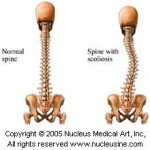If you have Scoliosis and you are experiencing Scoliosis pain, this may be caused by the physical spinal curvature. Some patients don’t experience any pain from their conditions. A lot of patients who do have pain are actually suffering from psychosomatic symptoms often brought on by the diagnostic nocebo effect of the curvature, rather than the curvature itself.

Having scoliosis in relatively common and the majority of patients have very mild curves that don’t need any treatment whatsoever. Most mild spinal curves will not cause any pain or even be noticeable to the patient or others. For those who have moderate to severe scoliosis, feeling scoliosis pain is very rare but it needs to be monitored. Some severe caused of scoliosis actually do compromise the integrity of the spine and can cause pain in the spinal structures, back muscles or internal organs.
True scoliosis pain from advanced scoliosis should be medically treated and possibly, in a surgical way. It is unfortunate that medical science doesn’t have many options when it comes to scoliosis correction.
Now, let’s move on the psychosomatic scoliosis pain. Out of the minority of scoliosis patients that don’t experience pain, most are suffering from a psychosomatic reaction to the nocebo effect of the diagnosis. This simply means that the patient has been frightened by being diagnosed with scoliosis and the mind takes the opportunity to create painful symptoms based on expectation, rather than biological causation.
This type of pain can’t be treated successfully using drugs or surgery. The only cure for psychosomatic reaction is knowledge therapy. This is the only treatment that treats the actual psychological/emotional cause of the symptoms.
For patients who are complaining of scoliosis pain or feel threatened that they might experience scoliosis pain, it is crucial to reassure a patient about the truth of their scoliosis condition. You have to make sure that they understand that mild to moderate spinal curvature is almost never painful and will not cause any disability. This is very important in young patients and those who have scoliosis in adults that are prone to fear, insecurity and exclusion due to their spinal curves. Parental and peer support can make the difference between a life filled with satisfaction and a life dominated by pain.
Consider all these things before you reassure yourself that you’re feeling scoliosis pain. Keeping in mind all these things will help you be more knowledgeable and will take your worries away.